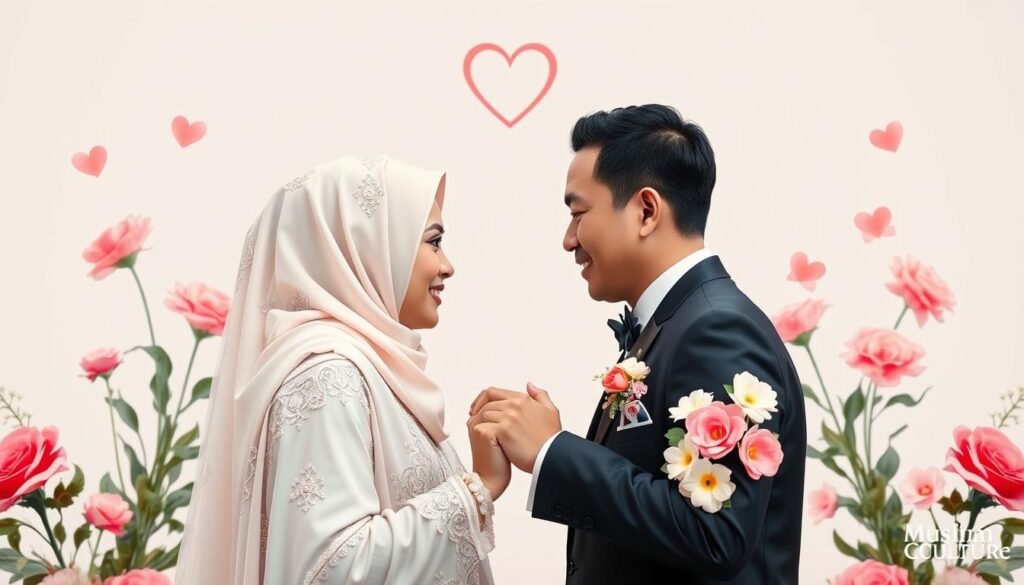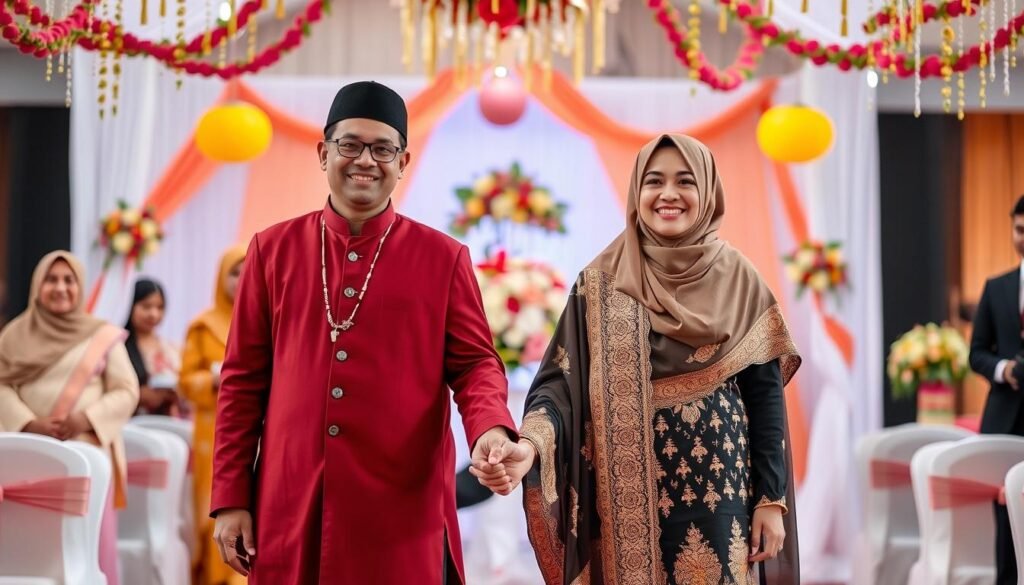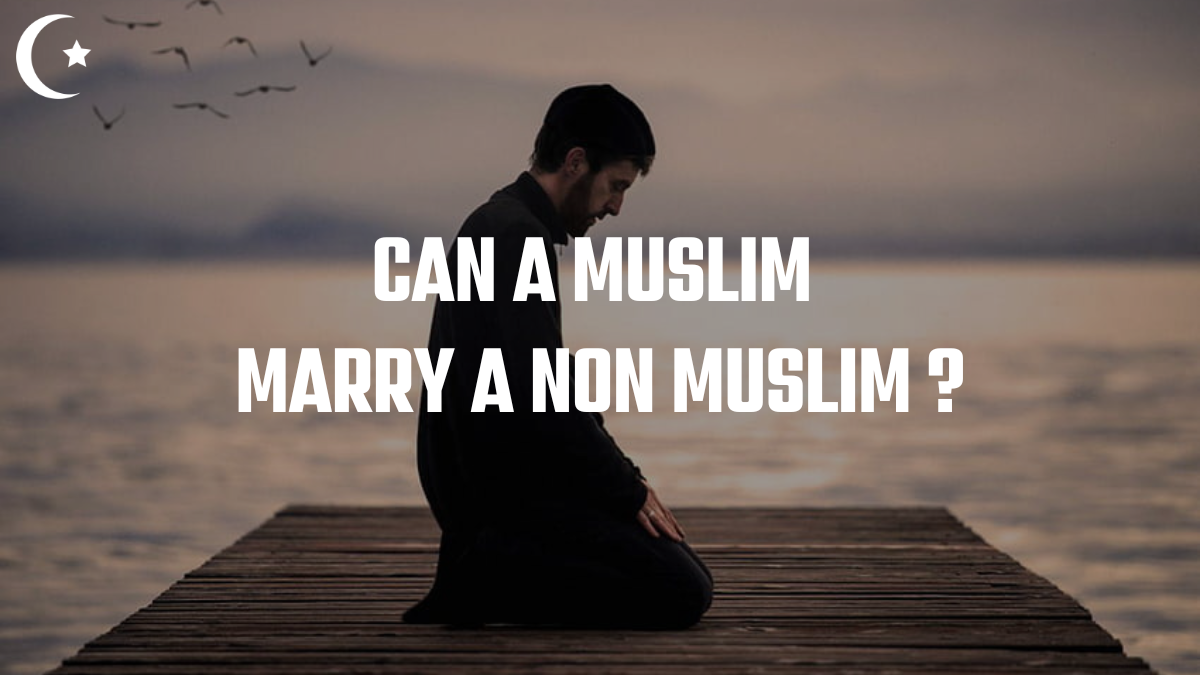Can love cross religious lines, or does faith guide our choices in love? The debate on whether a Muslim can marry a non-Muslim brings up deep thoughts on interfaith marriage. It shows how religious beliefs and modern views clash and change.
Today, more people from different faiths are falling in love and getting married. This makes us think about what Islam says about marrying outside one’s faith. It’s not just about rules in Islam but also about how culture affects these choices.
Understanding Interfaith Marriage in Islam
Interfaith marriage is when people of different religions get married. In Islam, there are specific teachings about these relationships. These teachings focus on those known as the “People of the Book,” which includes Christians and Jews. They share similar religious texts and values, making them a key part of the discussion on interfaith dynamics.
Views on interfaith marriage change with culture and society. In Muslim-majority areas, opinions have shifted, especially in Western countries where diversity is more accepted. This change shows a growing understanding and respect for different faiths. It also highlights the challenges of blending different religious beliefs in family life.
Islamic Jurisprudence on Interfaith Marriages
Islamic law has clear rules about interfaith marriages, focusing on what Muslim individuals can do. Key Quranic verses let Muslim men marry women from other faiths like Christians and Jews. These rules aim to promote respect and understanding between different faiths.
However, Islamic law does not allow Muslim women to marry non-Muslim men. This is backed by many Quranic verses. It’s a big part of the debate in Sunni and Shia views. The rules also reflect the beliefs and social norms of the time, which affects how we see them now.
Experts from various schools agree on these main points, but they have different views. It’s important to understand these differences to see how Islamic law affects interfaith relationships. This shows how tradition and faith guide people’s choices today.
Can A Muslim Marry A Non Muslim?
Many Muslims wonder if they can marry someone from another faith. They ask about marriage rights and what the Quran says about such relationships. Islam lets Muslim men marry women from the People of the Book, like Jews and Christians. This is based on both cultural and religious beliefs, showing the need to respect both partners’ faiths.
However, Muslim women have stricter rules when thinking about marrying non-Muslim men. These rules come from old beliefs about faith and family. This can make it hard for those who want to marry someone from another faith. Those in interfaith marriages must make sure they respect and understand each other’s beliefs.

Marital Guidelines for Muslim Men
For Muslim men thinking about marrying non-Muslim women, it’s key to look at the Quran’s guidelines. These Islamic marriage guidance rules are crucial, especially when it comes to marrying the People of the Book, like Christians and Jews. The Quran says it’s okay under certain conditions, like mutual respect and shared values.
Permissibility of Marrying People of the Book
Marrying non-Muslim women is okay if they follow their faith deeply. But, it’s important to think about the interfaith marriage challenges you might face. You’ll need to balance keeping your children’s faith with respecting your partner’s beliefs. Experts say talking openly about your faith is key.
Cultural Considerations in Interfaith Marriages
Culture greatly shapes how these marriages are seen. Family reactions can be a big deal; they vary a lot by region and family expectations. The Muslim culture can put a lot of pressure on people in these marriages. Knowing that family support can make things easier can help in making a choice.
Restrictions on Muslim Women Marrying Non-Muslim Men
The rules for Muslim women marrying outside their faith come from old Islamic teachings. These rules show how women had fewer rights back then. They were seen as needing to follow Islamic law more closely, especially in marriage.
Scholars believe these rules help keep Muslim identity strong in families. They worry about problems that could happen if a Muslim woman marries someone from another faith. These issues might include differences in how they practice their religion, family support, and how to raise children.
Today, these rules are being looked at more closely, especially as women’s roles in society change. New views are pushing for women to have more say in who they marry. This debate affects Muslim women’s rights and their choices in relationships with people from other faiths.
You may also be interested in:
Current Trends in Interfaith Marriages Among Muslims
Recent trends show big changes in Muslim communities, especially for women in interfaith marriages. More people now see interfaith relationships as okay, leading to more of these marriages. Women are becoming more open to marrying people from other faiths.
Statistics on Muslim Women Marrying Non-Muslim Men
Pew Research shows more Muslim women are marrying outside their faith. This trend is seen more in some Muslim groups. These marriages show how personal choices can affect society, making us think about how these unions change Islamic identity and culture.
Changing Attitudes in Modern Societies
Views on interfaith marriages are changing in many places. Women’s independence and exposure to different cultures help make these marriages more accepted. Now, society talks more openly about these unions, showing how views on marriage are evolving.

Challenges Faced in Interfaith Marriages
Interfaith marriages bring unique challenges that affect family acceptance and household dynamics. Couples face issues from different religious beliefs, traditions, and expectations. It’s key to understand and address these differences for a successful marriage and harmony in the family.
Religious Conflicts and Family Relations
Religious differences can lead to conflict, especially with strong opinions from families and friends. Couples must use good conflict resolution skills to avoid misunderstandings. Clear communication helps build respect and makes handling family dynamics easier.
With careful planning, partners can create a supportive environment for their relationship.
Raising Children in an Interfaith Context
Raising kids in interfaith families means dealing with religious education and upbringing. Parents need to find ways to let their kids value both backgrounds. It’s important to have open talks about faith and identity.
This approach helps kids understand their heritage and feel they belong. It also encourages them to explore their beliefs.
Legal Framework for Interfaith Marriages in Muslim-majority Countries
In Muslim-majority countries, laws on interfaith marriages vary a lot. Some allow these marriages, while others don’t. This affects Muslim women who want to marry non-Muslim men a lot.
Turkey and Indonesia are more open, letting people register their interfaith marriages. But, Saudi Arabia and Afghanistan stick to old views, making it hard for these marriages to happen.
What the law says about marriage shows a country’s culture and beliefs. Laws can ask the non-Muslim spouse to convert to Islam or stop interfaith marriage. Each country has its own rules, making it complex.
Knowing these differences helps people understand marriage laws in different places. Scholars want to change old laws that don’t fit today’s values.
Reformist Views on Interfaith Marriage in Islam
In recent years, reformist views in Islam have started to support interfaith marriages more. They believe in a broader understanding of relationships. Scholars of progressive Islam say old views often miss the point of modern marriages. They focus on equality and partnership.
These scholars argue that marriage is about shared values, respect, and love, not just faith. They want to make interfaith marriage a real option for couples from different backgrounds. This change shows a move towards being more open in Islamic thought.
More Muslims are now supporting understanding and acceptance of interfaith marriages. This shift is changing laws and social views on these marriages. It shows that Islam can adapt and change with the times. The push for accepting interfaith marriages shows Islam’s strength and flexibility in a new world.
FAQ
Can Muslim men marry non-Muslim women?
Why are Muslim women prohibited from marrying non-Muslim men?
What are the cultural implications of interfaith marriages in Muslim communities?
How does Islamic jurisprudence view interfaith marriages?
What challenges do couples face in interfaith marriages?
Are there any significant trends in interfaith marriages among Muslims in recent years?
What legal contexts govern interfaith marriages in Muslim-majority countries?
How do reformist scholars approach the topic of interfaith marriage in Islam?
What advice can help interfaith couples succeed in their marriage?
How should interfaith families address child-rearing in a mixed-belief household?

Embracing Faith, One Insight at a Time!
The teachings of the Quran have always guided my path. With a deep passion for Islamic knowledge, I strive to blend the wisdom of tradition with the relevance of today, making the timeless messages of Islam accessible and meaningful for everyone.
Muslim Culture Hub is my platform to share historical insights and thought-provoking articles, exploring both well-known and lesser-discussed aspects of Islamic culture and beliefs. My mission is to create an inclusive online space where everyone can learn, strengthen their faith, and connect with the profound message of Islam.
Join the journey!
May peace be upon you.








